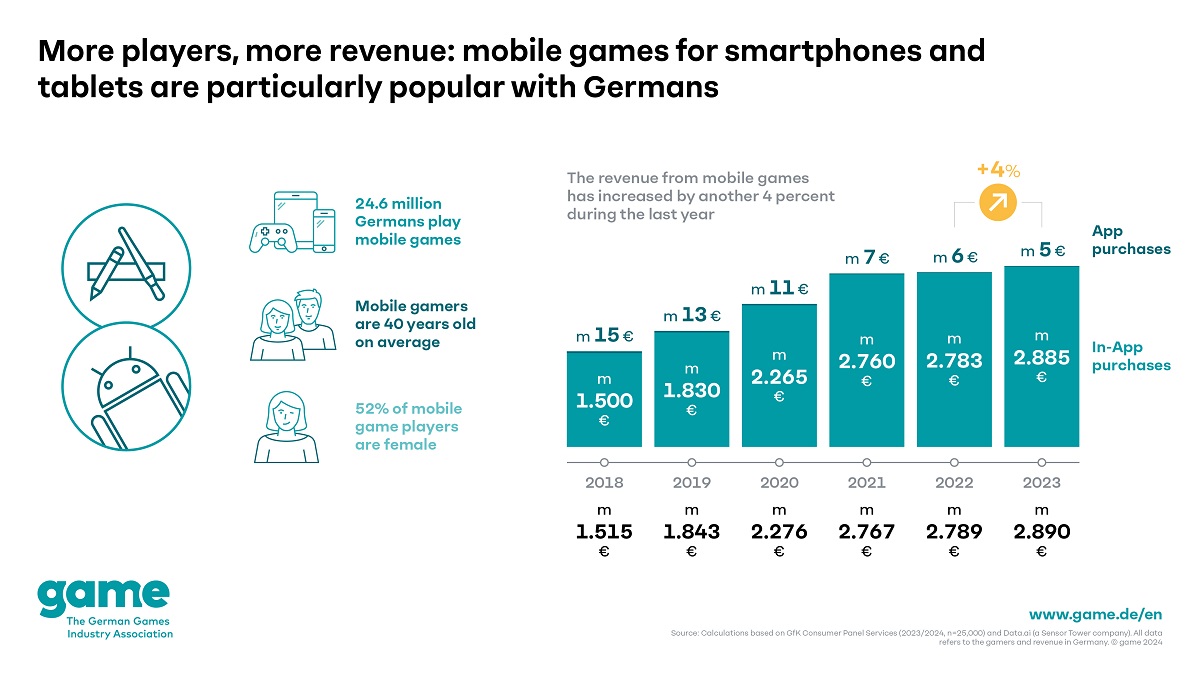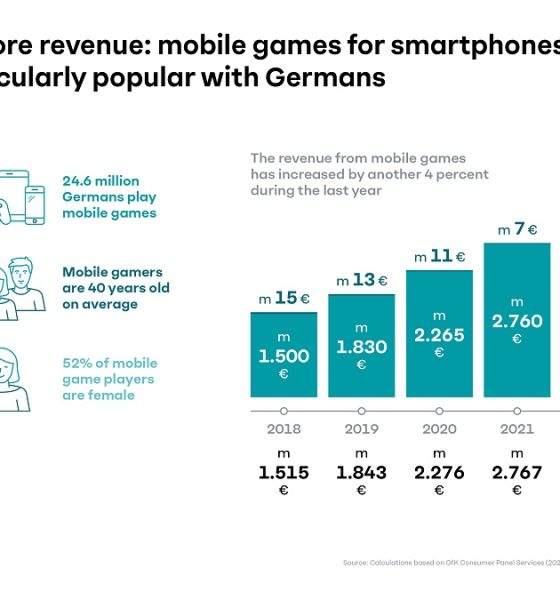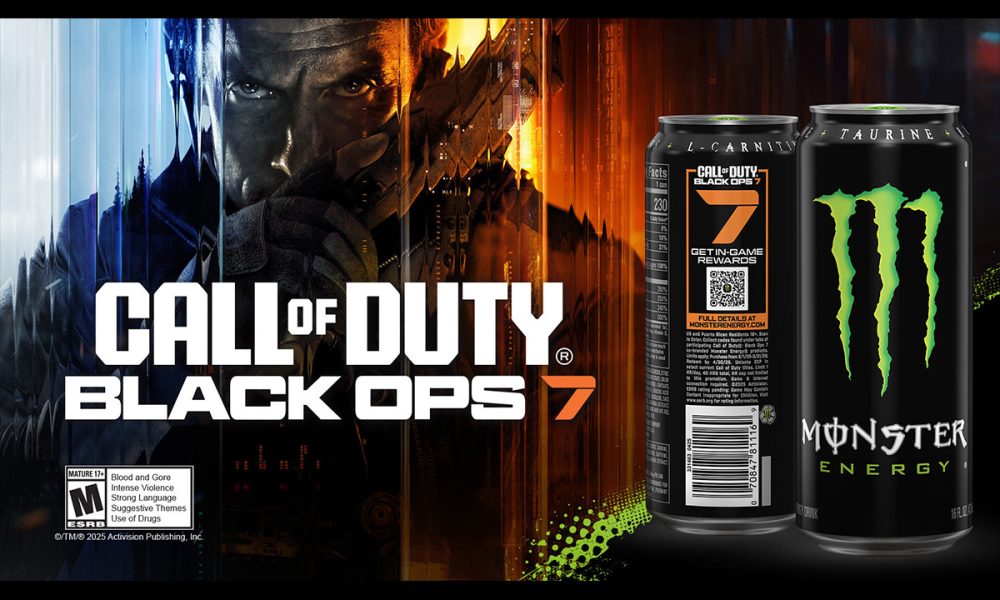

gaming
More players, more revenue: mobile games are very popular among Germans
- Revenues from games apps grow in Germany by 4 per cent to over 2.9 billion euros
- Smartphones and tablets attract 300,000 additional players in twelve months
- ‘Mobile games often attract people with little or no experience of playing video games’
Games apps for smartphones and tablets continue to do well in Germany: revenues from mobile games grew by another 4 per cent to 2.9 billion euros within a year. This part of the games market has almost doubled since 2018, when revenues amounted to 1.49 billion euros. These are the figures released today by game – The German Games Industry Association, based on data collected by the market research company data.ai. Not only were games app revenues up, but the number of mobile game players also grew by 300,000 to 24.6 million in the space of a year. The average age of people who play video games on their smartphone in Germany is 40. Women tend to play more on smartphones and tablets (52%) compared to men (48%).
‘Games apps for smartphones and tablets are very popular among Germans,’ says Felix Falk, Managing Director of game. ‘Although we’ve been witnessing the unstoppable rise of the smartphone for almost a decade and a half, this is still an area of the game market that continues to grow. Mobile games often attract people with little or no experience of playing video games. The mobile gaming market has grown hugely over recent years: alongside classic casual games for spare moments, complex games and even esports titles are now also firmly established. This variety is unique and one of the strengths of games apps.’
A closer look at the mobile gaming market in Germany highlights the distinctive features of the sector: around 5 million euros – significantly below 1 per cent of total revenues – is generated by the sale of individual mobile games. Revenues from online gaming services on smartphones and tablets are significantly higher, amounting to 43 million euros or around 1 per cent. 98 per cent and therefore almost the entire revenue from games apps – 2.9 billion euros – is generated with in-app purchases. These include cosmetic enhancements for players’ own avatars along with virtual currencies and loot boxes or large story expansions.
Strong development of the German game market in 2023
The German games market showed significant overall growth again in 2023, with revenues from games, gaming hardware and online gaming services increasing by 6 per cent, to some 9.97 billion euros. This considerable rise follows a revenue increase of just 1 per cent in the preceding year. The largest drivers of this growth include game consoles and related accessories, as well as in-game and in-app purchases. At the same time, sales of gaming PCs and laptops saw clear declines in some areas.
The post More players, more revenue: mobile games are very popular among Germans appeared first on European Gaming Industry News.
Call of Duty
Monster Energy and Call of Duty Unite Again with Exclusive In-Game Rewards and Expanded Program Timing

Monster Energy is teaming up once again with Call of Duty to deliver bonus in-game rewards, bonus 2XP and an expanded promotional window that gives fans even more opportunities to fuel up and power their gameplay.
Gamers and Monster fans can start collecting codes to stockpile rewards ahead of the highly anticipated release of Call of Duty: Black Ops 7 on November 14. Following the record-breaking success of the last year’s program – the 2025 campaign has been extended and will run through March 31, 2026, with code redemption available until April 30, 2026.
Players who purchase specially marked Call of Duty cans of Monster Energy, Monster Zero Sugar, or Monster Zero Ultra can find a unique code under the tab and redeem it online at callofduty.monsterenergy.com. Every can unlocks bonus in-game items and double experience points.
2025 in-game rewards include:
• 1 Can = “Energy Flash” Large Decal + 15 min 2XP
• 2 Cans = “Peacekeeper MK1 – Hyper Green” Weapon Blueprint + 15 min 2XP
• 3 Cans = “Green Fury” Operator Skin + 15 min 2XP
• 4 Cans = “VS Recon – Green Thunder” Weapon Blueprint + 15 min 2XP
• 5 Cans = “Daylight Ripper” Operator Skin Recolor + 15 min 2XP
In addition, select retailers will feature specialty bonus in-game content such as Emblems, Charms, Weapon Stickers, and Dual 2XP.
And as an added bonus, fans who create an account on callofduty.monsterenergy.com before October 31 will score a Black Ops 6 in-game skin – no purchase required.
“Monster Energy is built on fueling competitive spirit and our collaboration with Call of Duty continues to push that to new levels. With expanded timing, bonus rewards and the unmatched value of Double XP in every can, this year’s program is our biggest and most exciting yet,” said Dan McHugh, Global Chief Marketing Officer at Monster Energy.
“We’re proud to continue building on the success of our partnership with Monster Energy. Monster is the go-to fuel of gamers and they are going to drink up these exciting in-game rewards,” added Cody Neal, Associate Director of Global Partnerships, Call of Duty.
The limited-edition Monster Energy Call of Duty cans are available in 16oz in Original Monster Energy, Monster Zero Sugar and Monster Zero Ultra. Special 4, 12, and 15 can Monster Energy Call of Duty multipacks are on shelves now.
The post Monster Energy and Call of Duty Unite Again with Exclusive In-Game Rewards and Expanded Program Timing appeared first on Gaming and Gambling Industry in the Americas.
gaming
Gamescom 2025: New Records and Important Impetus for the Games Industry in Germany and Worldwide

Gamescom 2025 ended with numerous new records and strong momentum for the games industry in Germany and worldwide. Records were once again set, particularly in terms of key figures such as internationality (70% of visitors from abroad, exhibitors from 72 countries), digital reach (more than 630 million views worldwide by 23 August evening alone), exhibition space (233,000 square metres) and the number of exhibitors (1568). On site, 357,000 fans visited the world’s largest festival of games culture. The number of trade visitors rose to 34,000, with a particularly strong increase in participants from the US, China, Canada and Japan.
“This year, gamescom 2025 is sending out a particularly positive signal. After two challenging years for the games industry, you could really feel the mood improving this year. The new record figures underline not only the global appeal of gamescom, but also the upward trend in the entire games industry. gamescom 2025 is also a milestone for the German games industry: political support for the additional tax-based games funding at gamescom was stronger than ever – from both the federal and the state level alike. This creates hope that progress will be made quickly. But there were also positive signals on many other political topics, whether for e-sports from Federal Minister Bär at the political opening or from Federal Minister for Family Affairs Karin Prien, who was just as convinced of the important work of the USK in the protection of minors as she was of the enormous potential of games for the education sector,” said Felix Falk, Managing Director of game – The German Games Industry Association, the co-organiser of gamescom.
Political interest in gamescom 2025 was greater than ever before. In total, over 600 politicians came to Cologne to see for themselves the current developments in the games industry and the enormous economic, cultural and technological potential of games. Whether from the federal states, the federal government or the EU, the political guests came from all levels. In addition, a particularly large number of international delegations travelled to gamescom, for example from this year’s gamescom partner country Thailand as well as from Brazil, Indonesia and India.
Gamescom 2026 will take place from 26 to 30 August. It will open on 25 August 2026 with the gamescom Opening Night Live.
The post Gamescom 2025: New Records and Important Impetus for the Games Industry in Germany and Worldwide appeared first on European Gaming Industry News.
gaming
Investment Opportunities in the Multi-billion-dollar Gaming Sector

The Gaming industry is growing day by day. It has already become a global entertainment giant. From sweeping open-world quests to quick, addictive mobile games, the industry has expanded into a multi-billion-dollar giant.
The global gaming industry was valued at over £135 billion ($184 billion) in 2023 and is projected to reach £184 billion ($250 billion) in 2030. It is driven by cloud gaming, which eliminates the need for costly consoles, high-speed internet, and immersive technologies like VR and AR. Revenues from VR gaming alone in 2023 exceeded £1.9 billion ($2.6 billion), and the AR gaming business is set to grow at a pace of over 30% annually.
The transition from physical to digital is virtually complete: in large markets, over 90% of games sold today are digital, with downloads, live services, and subscriptions replacing cartridges and discs.
Alternative Ways to Invest in Gaming
The gaming industry is not merely a business of copying the most recent blockbusting release; it’s a rich, diverse ecosystem with several streams of revenue, from historic game publishing to aggressive esports and the burgeoning betting and online gambling sector. Today’s investors are able to access entertainment-oriented and wagering-led segments, each with their distinct risk and reward profiles.
Video Game Development & Publishing
Envision house brands behind the mega-franchises of Call of Duty, FIFA or The Legend of Zelda. These brands have enormous fan bases and generate revenue that stretches far past the initial buy, with in-game purchases, downloadable packs and subscription content keeping gamers engaged and expenditures year-round.
Esports
Esports have now evolved from casual living-room games to multi-million-dollar tournaments streamed live in front of a global audience. Internet gambling on esports competitions is also becoming a niche but growing market, offering a new source of revenue for both organisers and financiers.
Online Betting & Casinos
This segment is focused on convenience, accessibility and growing demand for real-money play. Online gaming sites and casinos are taking advantage of more lenient rules in key markets, so that they now represent a more mainstream and profitable part of the gaming economy.
Spotlight on Online Gambling
Online casinos are no longer merely whirring slot machines; they’re pushing boundaries. Some of the top 20 online casinos have gone beyond traditional slots and table games, incorporating esports betting, skill-based game challenges and interactive live dealer games.
Why does that matter to investors? Easy. It signals flexibility. These platforms are captivating players where they are: at their phones, on streaming websites, and in hybrid entertainment spaces that blur the line between socialising and gaming. This flexibility is what can keep revenue streams consistent even when trends shift.
Why Investors are Paying Attention
The gaming market has something that a lot of others envy: loyal consumers who are spenders on a regular basis. It’s £3 ($5) on a character skin or £36 ($50) on a new game, but the spend is cumulative, and it doesn’t evaporate during poor economies.
And gaming pervades everywhere. A hit title in Japan can find fans in Brazil in days. And for companies, that global reach means multiple streams of revenue and endless room to grow.
Risks in Investment
There is no investment without risk. Regulations change overnight, especially in online gaming. Game developers also come and go with their biggest hit; one flop can jerk their stock price. And in this competitive environment, being new is a never-ending struggle.
Gaming Investment Strategies
Diversify among multiple corners of the sector. That way, you’re not betting everything on one game or one trend. Gaming-focused ETFs deserve a look as well if you enjoy a pre-packaged solution that spreads the risk.
The post Investment Opportunities in the Multi-billion-dollar Gaming Sector appeared first on European Gaming Industry News.
-

 gaming3 years ago
gaming3 years agoODIN by 4Players: Immersive, state-of-the-art in-game audio launches into the next generation of gaming
-
EEG iGaming Directory8 years ago
iSoftBet continues to grow with new release Forest Mania
-
News7 years ago
Softbroke collaborates with Asia Live Tech for the expansion of the service line in the igaming market
-
News7 years ago
Super Bowl LIII: NFL Fans Can Bet on the #1 Sportsbook Review Site Betting-Super-Bowl.com, Providing Free Unbiased and Trusted News, Picks and Predictions
-
iGaming Industry8 years ago
Rick Meitzler appointed to the Indian Gaming Magazine Advisory Board for 2018
-
News7 years ago
REVEALED: Top eSports players set to earn $3.2 million in 2019
-
iGaming Industry8 years ago
French Senator raises Loot Boxes to France’s Gambling Regulator
-
News7 years ago
Exclusive Interview with Miklos Handa (Founder of the email marketing solutions, “MailMike.net”), speaker at Vienna International Gaming Expo 2018













